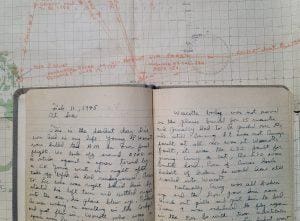War is a meat grinder. It’s a terrible thing for a close friend to die in actual combat. But in some ways, when a buddy dies in a senseless training accident during wartime, it’s even worse—it seems so pointless. And if you were the guy who caused the accident that killed others, it can become a burden too hard to bear. There are many ways to be a casualty of war—and they don’t all involve blood.
This account is a tribute and a memorial to the raw courage of the men who fought and flew during the second world war, knowing that death could come just as easily from something as innocuous as a split-second lapse of attention, as from the enemy’s gunfire.
Lewis M. Cobb is my father. I am thankful he is one of the men who did come home from combat deployments in WW2, Korea, and Vietnam. But members of his combat team on his second deployment in WW2 did not come home. They were both lost on the same day—February 11, 1945.
On Cobb’s first combat tour he’d flown F6F Hellcats with VF-5 on the Yorktown (CV-10). At the conclusion of that deployment he was ordered to Pensacola to train his own combat team: Young, Lee, Wescott, and Curry. They would comprise Team 9 on VF-30. Cobb was 22, his team even younger.
On January 19, 1945, Team 9 joined the “Fighting Thirty” aboard the USS Belleau Wood (CVL-24). The next day the ship hoisted the hook and passed under the Golden Gate bridge, headed for Pearl Harbor. Ultimately they would steam for the farthest forward of the advance bases, Ulithi, for strikes on the Japanese homeland. The following account was taken from my dad’s diary.
A word of explanation: the LSO mentioned in the account is the “Landing Signal Officer,” whose job is to guide aircraft safely down when they are landing on an aircraft carrier. A “waveoff” tells the pilot he’s not lined up right for landing, or the deck is not clear, and he needs to circle around and try again. A “cut” tells the pilot to cut his engine, causing the aircraft to land.

Sunday, February 11, 1945 At Sea
This is the darkest day I’ve ever had in my life. Young and Wescott were killed this AM on our first flight. We took off around 0700 on a strike against a spar towed by a CV. Young went in right after take off, before he had rendezvoused. According to Lee, who was right behind him, he started his left turn and settled right into the sea, his plane blew up. Evidently he was working on something in the cockpit and just flew in. Wescott, who was a spare, was launched in his place. The hop went off OK and was 3 1/4 hrs long. I landed first, Curry got a waveoff, then Lee came aboard, followed by Wescott. For some unknown reason, the deck crew held Wescott aft of the barriers. Due to carelessness, the LSO gave Curry a cut with Wescott still aft of the barriers. Curry's hook pulled out on no. 5 wire and he crashed on top of Wescott. Wescotts death was merciful, the planes caught on fire immediately and Curry was very fortunate to get out unhurt.
Wescott’s body was not saved as the planes burned for 15 minutes and finally had to be pushed over the side still burning. It was not Curry’s fault at all nor was it Wescott’s fault. It was the LSO’s fault for giving Curry a cut. The LSO was busted down. Even if Curry’s hook hadn’t of broken he would have still crashed into Wescott.
Naturally Curry was all broken up and the Doc gave him some knock out pills and put him to bed. Team 9 was scheduled to fly again in the P.M. So with two substitutes Lee and I flew again, Lee didn’t want to fly nor did I but I believe it was best we did.
This is the termination of Team 9. We no longer have enough pilots for nine teams. The skipper, since he does not have combat experience nor do any of his team, has asked me to lead his 2nd section. Since I’ve lost my team, I don’t care where or if I fly. I wouldn’t have been prouder of my boys than if they were aces.
Even years later, dad was unable to talk about this awful accident without tears. My father passed away in 2011.
I am grateful toward those who have served and have come home. Thank you for dedicating a portion of your life to serve our country.
I am especially thankful for those who’ve paid the ultimate price in the service of our nation.
And I am grateful to their families who have also paid a price: they must live with the heart-rending loss of a father or mother or son or daughter. On this Memorial Day of 2023, may our country strive to be worthy of your sacrifice.






